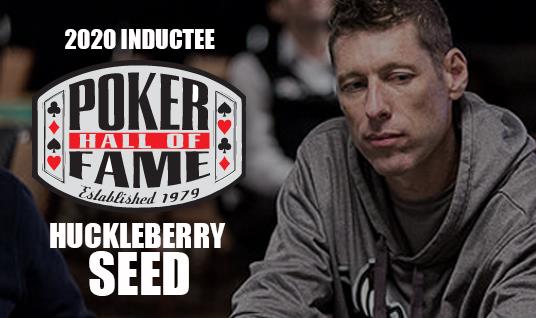This week, Huckleberry “Huck” Seed became the 59th inductee of the Caesars-owned and WSOP-affiliated Poker Hall of Fame. The very worthy Seed has logged over $7.6 in recorded tournament earnings, unspecified millions more in cash games, and has claimed four WSOP bracelets and a 2010 World Series of Poker Tournament of Champions.
Add in Seed’s popularity with his fellow high-stakes pros and his talent for getting involved in athletically-based, high-stakes prop bets, and there’s no doubt at all that he’s a very deserving enshrinement. And yet Seed’s honor comes in the year that the Poker Hall of Fame itself made significant changes to its finalist voting methodology.
The two big changes this year were the PHOF reducing the number of inductees each year from two to one, for the first time in more than a decade. Mike Sexton’s induction in 2009 marked the last time just one person was honored, though that was due to an unusual split in the voting system used at the time, where as the 2020 election of Seed was by design.
The second change was the elimination of the media panel which served as part of the group that voted on the finalists. Such a media panel had been part of the process for close to 20 years, but this year, Caesars and the WSOP decided to allow only the 31 living PHOF members to vote on the finalists.
Whether those changes specifically helped get the 51-year-old Seed elected this year instead of a later time is a matter for conjecture. There’s little doubt, however, that the changes implemented for 2020 will make the Hall more insular, as well as shift the weight of the vote more in favor of professional players, as opposed to “industry” types.
I believe both of the changes were backward steps, for multiple reasons, though it will likely be several years before Caesars and the WSOP fully appreciate the errors of its choices. Let’s look at why.
Reducing the number of inductees from two to one seems incredulous on its face. After all, we’re just a few years removed from the boom years for poker, when it exploded in popularity across the globe. One offshoot of that growth is that many more players can now claim accolades of the type that used to get players elected in earlier years. So instead of keeping the annual number at two or raising it to three or more, the WSOP makes it far tougher to be elected by narrowing it down to just a single inductee?
That makes little sense, and it will do nothing but continue to cement the Poker Hall of Fame’s current stance as a somewhat stilted and very Vegas-centric institution. One of the problems with the PHOF is that it’s always underserved the global poker family, all but ignoring players and industry people whose poker achievements are on a par with inductees who just happened to live and play in Nevada and the rest of the US.
Worse, by throttling down the annual enshrinement count from two to one, it will leave the PHOF over-represented with players from the ’70s, ’80s, and ’90s, when bracelet wins went to the winners of events with literally tens of participants, as opposed to the thousands of players that chase many bracelets today. The change from two to one represents a disservice to the modern poker era, though it may be a while before the poker world fully appreciates it.
Removing the expert media panel also serves to protect the same insular interests. Simply put, players are somewhat more likely to vote for other players, while the expert media panel has always been a bit more aware of industry peeps’ overall contributions to the game.

Returning to this year’s election of Seed, did the change influence the results? It’s not that easy to weigh down, yet when the list of the ten PHOF finalists was announced, it offered interesting options to the voters. Seven of the ten finalists were best known as players, while the other three came from the industry side. Of the seven players, six were primarily Vegas-based, and four of the six appeared to have more backing for induction than the rest. Those four somewhat favored finalists were Seed, Ted Forrest, Eli Elezra, and Antonia Esfandiari.
One could have projected that among those four choices, each might have garnered comparable numbers of ballots. Meanwhile, each of the 30 eligible voters who participated had 10 votes to distribute among the finalists they deemed most deserving. This year, also for the first time, the Poker Hall of Fame announced the actual voting totals:
• Huckleberry Seed – 76 Votes
• Matt Savage – 51 Votes
• Isai Scheinberg – 45 Votes
• Eli Elezra – 30 Votes
• Antonio Esfandiari – 23 Votes
• Lon McEachern and Norman Chad – 20 Votes
• Ted Forrest – 20 Votes
• Mike Matusow – 17 Votes
• Patrik Antonius – 15 Votes
• Chris Ferguson – 3 Votes
So Seed received 76 votes, while Elezra, Esfandiari and Forrest combined received 73 votes. What gives?
If there’s any actual evidence that the so-called “Doyle bloc” or another bloc of PHOF voters exists, this might be it. For years, rumors have circulated that several of the existing inductees have compared notes beforehand and then have collectively thrown most of their weight and their votes behind a single individual. While it’s worth reiterating that Seed is a very qualified inductee anyway, it’s hard to see how he would get 50% more votes than any other candidate.
There’s going to be an easy way to see if it’s true come 2021 enshrinement time. If one of these other players — Forrest, Elezra, Esfandiari, etc. — suddenly shoots to the top of the voting and wins enshrinement next year, then we’ll know that the bloc-voting problem is real, not just rumor.
It’s also worth noting that two industry people, Matt Savage and Isai Scheinberg, finished second and third. Savage’s continuing absence from the roll of PHOF enshrinees is one its biggest embarrassments. Scheinberg, meanwhile, represents the most intriguing side story.
It’s been something of an open secret that Scheinberg has annually been one of the leading nomination-getters during the PHOF’s annual public nomination process, but has been culled from the list of finalists by the the PHOF’s internal Selection Committee. The reasons were horrible optics and perhaps a little bit of bad blood, the latter being that certain Caesars and WSOP execs resented the way that PokerStars virtually overran the whole WSOP spectacle beginning around 2007.
Yet despite Scheinberg’s immense importance to the poker world, he was in essence blackballed for many years. The WSOP had a ready-made reason: Scheinberg was still wanted by the US Department of Justice for his role in the “Black Friday” online poker crackdown.
Once Scheinberg reached a plea deal with the US government, completed a time-served sentence in private lodging and paid a smallish (for him) $1 million fine, it was done. It also left Caesars and the WSOP with no hard reasons to keep excluding Scheinberg from the finalists list for PHOF induction.
Meanwhile, in what has to be at least a little bit of hypocrisy, the PHOF kept on accepting Chris Ferguson as a finalist, despite the fact that Ferguson faced civil charges connected to the very same online-poker crackdown that ensnared Scheinberg. Ferguson was a primary owner and board member of Full Tilt Poker and was also the person that cursed the poker world with Ray Bitar’s presence, bringing him on board to run the Full Tilt finance ship.
Yet Ferguson was a Vegas and California poker insider, unlike Scheinberg. It’s also hard to understand how Ferguson could be nominated by so many people as to become a finalist but only receive three votes. Then again, in my opinion he should get zero. Mudd is Mudd.
Piling on a bit, two of the other “player” finalists, Matusow and Forrest, were also part owners of Black Friday sites. Matusow famously went through all his millions in Full Tilt owner payouts and was so degen as to have received more in loans from Full Tilt that went unpaid as the company went belly-up in 2011.
Meanwhile, Forrest, one of the hidden owners of UltimateBet, also fell on harder times when his income stream dried up. Forrest ended up being sued by several casinos over bad casino markers, though perhaps his biggest blunder was getting into a weight-loss prop bet with — you guessed it — Matusow, in 2010, then somehow expecting to get paid by Matusow amid all the Black Friday whirlwind. That the DOJ was on the hunt well before 2010 or 2011 was known to all these online-poker owners, but they just chose to believe and act like the money machine was never going to end. Silliness. Stupidity.
But anyhow. Several existing PHOF members already had big online-poker connections — Doyle Brunson, Hellmuth, Negreanu, and more. Online poker itself has never been a barrier to entry into the PHOF. Yet the anti-Isai Scheinberg skew within Caesars and the WSOP still appears to have been a thing.
Perhaps it was even the impetus for the otherwise inexplicable decision to reduce the number of annual inductees from two to one. Had the traditional two finalists been elected, Scheinberg would have missed being inducted by a single vote, in his first year of “official” eligibilty and being a finalist.
The PHOF powers that be also had to know that newer inductees would on average be more likely to give Scheinberg some votes, just because of the way the industry has evolved.
There’s a bit of smoke there. Maybe there’s some fire underneath; maybe not. Maybe the moves from two to one inductees and removing the media panel had the hidden purpose of serving as an additional barrier to Scheinberg’s enshrinement. If the “Doyle bloc” or a similar group votes in unison for a player, they can largely dictate who gets elected in any given year. We’ll see how it plays out in future cycles.

